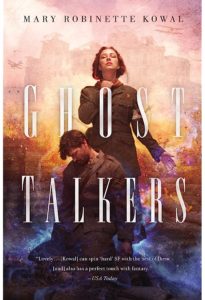By mid-1916, British forces fighting in Europe have mastered the logistics of spiritualism well enough to gain occasional tactical advantages in the never-ending trench warfare of the Western Front. Men die; they report in to the Spirit Corps; the knowledge that they bought with their lives — a sniper’s location here, a hidden advance there, a flanking attempt somewhere else — goes back out to the field, in hopes that it arrives fast enough to make some sort of a difference in the unending slog of mud and blood. The mediums who take the reports give the dead soldiers something in return: comforting words that their sacrifice had meaning, and a chance to send a last message home.
Kowal makes it visceral for readers. Here is how Ghost Talkers starts: “The Germans were flanking us at Delville Wood when I died.” The young man giving his report to Ginger Stuyvesant, a medium in the Spirit Corps, is proud of his training. Despite a fatal wound from an artillery shot, he has his comrades prop him up so he can see more, remembers to note the time, and manages to report back within minutes of his death.
In a warehouse in Le Havre, dozens of spirit circles, each led by two mediums, take in the reports of the dead and send that information to the commands and to the front. The British think the work of the Spirit Corps is important enough to have a multi-level deception in place to cover details of its operation. Harry Houdini’s and Arthur Conan Doyle’s debunking tours are meant to hide the truth that spiritualism is real, has been mastered on an industrial scale, and is playing a role in the British war effort that the high command considers vital. The soldiers are trained to think that they are posthumously reporting to London. The spiritualist operations in Le Havre take place under cover of the larger Spirit Corps that provides recuperating soldiers with a spot of tea and a bit of normalcy, something that also took place in the history outside of Ghost Walkers.
Despite these precautions, the Germans have somehow gotten wind of the operation, as Ginger discovers when she takes the report of a British officer who was murdered in Le Havre. She takes her suspicions to the local commander — she’s been deputized as liaison in the place of her aunt, Lady Penfold, who can’t keep a secret to save many lives — who dismisses the notion. Ginger not only lacks a title, she’s an American, and most disqualifying of all in the eyes of Brigadier-General Davies, a woman.
Kowal shows one tried and true solution to that all-too-common problem:
“I took a report from an officer who was murdered while in Le Havre by someone who appeared to be a British officer. I stepped into the man’s soul and experienced his death, so I’m absolutely certain it was murder.”
“My God,” [said Lady Penfold].
Ginger took a breath. “My problem is that I told Brigadier-General Davies about it and he believes I am making it up. Could you speak with him? I think he might take your title more seriously. He’s always annoyed when I come to meetings instead of you.”
Snorting, Lady Penfold sat back in her chair. “I will do one better than that. I will speak to his wife. We will get this sorted out, posthaste.” (p. 63)
Ginger and her circle are on their own to try to find the traitors, as it soon becomes clear that the murderer was not working alone. Her allies include her fiancé Ben, an intelligence officer also working from Le Havre; Helen, the other medium in her circle, whose Caribbean background shows that the Spirit Corps is open in ways the rest of the British Army is not; Aunt Edie, the aforementioned Edith Lady Penfold; Mrs. Richardson, an older woman doing her bit as part of Helen and Ginger’s spiritualist circle; Joanne, Lt. Plumber and Mr. Haden, all further members; plus others swept up along the way. Ghost Talkers is a counterespionage murder mystery set inside a war novel set inside a novel of the supernatural. At times, it reminded me of a particularly good Connie Willis book: there is a largeish cast with a central romance, levity amidst tragedy, snappy dialogue and a bit of madcap adventure. Like the best of Willis, the tone is light but the emotional heft is serious, and even the most important characters are not immune to permanent reversals.
Kowal also shows how the prejudices of the day hampered the British cause, and often gave bad actors a free pass. Indian soldiers, for example, are not given the tokens that enable them to report in after death, and a chance encounter shows Ginger that the Indian troops have their own traditions and methods of spiritualism that England is overlooking entirely. Nor does Kowal shy away from the coarsening effect of war on even the gentlest of natures. Not that the German spies in the midst of the English could be called gentle souls, but at one point they engineer the deaths of hundreds to cover the tracks of one agent. The overall inhumanity of industrial war is there, without going full Remarque, but with telling details. For example, Ginger and her circle suspect that the Germans are deliberately targeting hospitals for artillery barrages before the Kaiser’s men start an offensive action, so that the Spirit Corps will be overwhelmed with newly dead and unable to gain useful information in time.
The pace never slows among narrow escapes, moments when the enemy seems two steps ahead, and small bursts of good luck. It’s difficult for a book to have a happy ending amid the Battle of the Somme, but Ghost Talkers manages what so many of those soldiers’ lives did not: a meaningful and satisfying conclusion.

